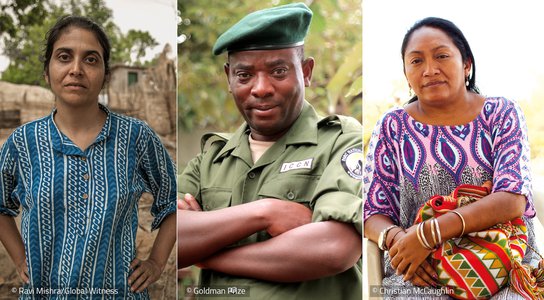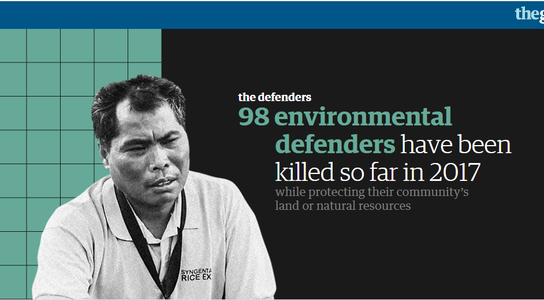- Special Rapporteur tells UN General Assembly: Rights activists are good for business, yet face threats, jail and even death for speaking out
- New report cites Global Witness data; shows that land and environmental defenders face disproportionate levels of killings and attacks
- Call to investors: Steer clear of countries and companies associated with attacks
Global Witness welcomes a new UN report, which outlines how business and governments are failing in their responsibilities to protect human rights defenders from threats and attacks.
The UN report echoes the findings from a recent Global Witness report showing record numbers of land and environmental defenders killed globally – 200 in 2016 alone.
Michel Forst, Special Rapporteur on human rights defenders, presented the report to the General Assembly, saying that those who stand up to business abuses have also faced criminalisation and murder. This runs counter to the fact that companies actually benefit from contexts where activists can speak freely and highlight the human rights risks of business projects.
Global Witness Campaigner Ben Leather said: “For too long, companies and investors have shirked their responsibility to support those who speak out about business abuses, often in the face of great personal danger. This expert report is unequivocal: whilst governments have the primary duty to protect defenders, it is unacceptable for business to stay silent as critics of their activities are threatened and attacked.”
Investors are increasingly implicated in attacks against defenders, said Forst criticising them for failing to do their homework prior to deciding which companies and projects to back.
The Rapporteur called on investors to develop early-warning systems (1) to respond to the risks facing activists, and recommended the use of investment criteria to exclude ‘countries and companies with extensive track-records of threats and attacks against defenders’. He said it was necessary for development banks, as well as private backers, to reform their practices.
States too are failing, the report shows. As well as acting at home, governments have a duty to control the behavior of their businesses abroad, and to provide redress when communities and activists are negatively impacted. A recent study showed that 25 per cent of attacks against defenders were connected with companies headquartered in Canada, China or the USA.
Leather said: “It is getting more and more dangerous for environmental activists and human rights defenders to protest against destructive industries and abusive business. This report demonstrates that governments, companies and investors are complicit in the violence. It is urgent that they implement its recommendations before more people are killed.” (2)
The Rapporteur concurred with a recent Global Witness report, stating that the root causes of the risks facing land and environmental activists ‘are often found in the exclusion of potentially affected communities from decisions regarding their land or natural resources’. ‘Only by guaranteeing [their right] to give or withhold their free, prior and informed consent… can the seeds of conflict be avoided’, he said.
The report shows the bias of many police and judicial systems, in prosecuting those who speak out, but failing to investigate when activists face threats or businesses are accused of crimes. Governments are also complicit in denying activists access to information on business activities whilst underlying causes of conflict, such as corruption, need to be tackled to ensure long term change.
/ ENDS
Contacts
-
Ben Leather
Campaigner, Land and Environmental Rights Defenders
Notes to editor:
(1) The Dutch development bank FMO, after criticism of its lending to the Agua Zarca dam opposed by murdered activist Berta Cáceres, recently announced moves to set up an early-warning system. This would be the first development bank to do so.
(2) Key recommendations from the report include:
- Governments should establish clear consequences for companies linked to attacks against defenders, and promptly and impartially investigate all attacks
- Companies should engage with defenders to develop human rights policies which address the risks they face
- Investors should withhold investment where impact assessments reveal serious threats to civic freedoms and defenders at the country or local level
You might also like
-
Report Defenders of the earth
2016 saw a record 200 killings of people defending their land, forests and rivers against destructive industries
-
The Defenders: our partnership with the Guardian
This year, in collaboration with Global Witness, the Guardian will attempt to record all of the deaths of people who are killed while defending their land, forests, rivers or wildlife – most often against the harmful impacts of industry.